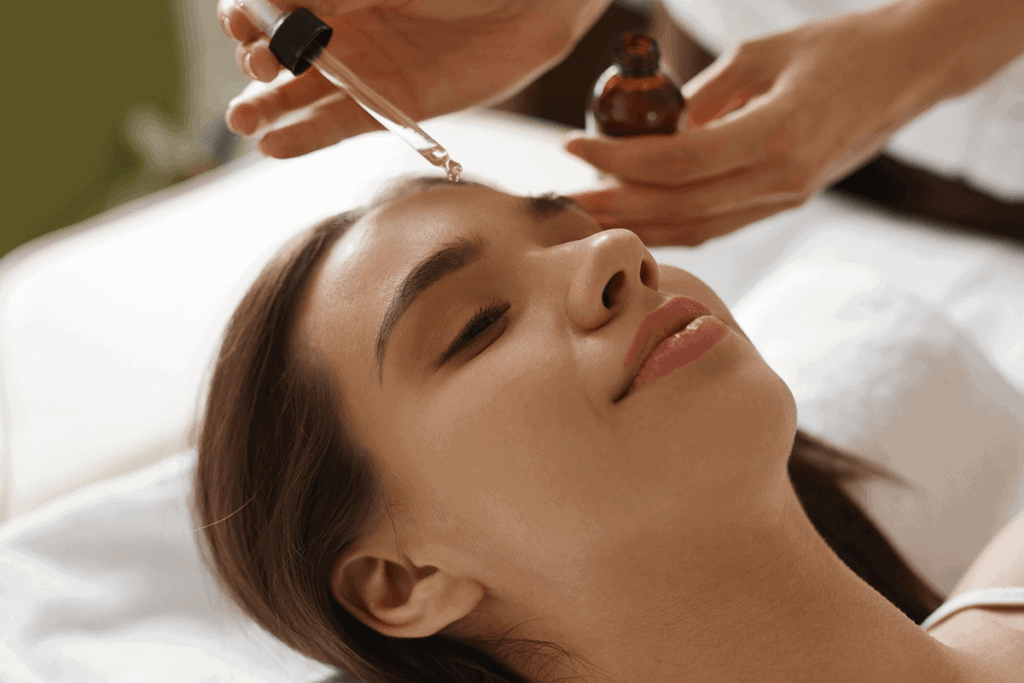Our sense of smell is powerful, but can it heal? The science says, in some cases, yes. While the therapeutic use of essential oils dates back to ancient civilizations, it only became popular in the United States in the 1980s. (9) Since that time, research has demonstrated that aromatherapy, inhaled or used topically, can have many beneficial health effects.

How does aromatherapy work?
Aromatherapy is a plant-based therapy that uses aromatic essential oils from a variety of plants to promote wellness. The mechanism of action is complex because these plants have different chemical properties that contribute to their therapeutic activity. When the aroma from the plant oils are inhaled, they interact with receptor cells in the body that send signals to the limbic and hypothalamus parts of the brain. (1) Essential oils used topically, such as during a massage, may also be absorbed through the skin to produce a therapeutic effect. (5)
Below are some examples of the medicinal herbs used in aromatherapy and their potential therapeutic properties and applications: (1)
- Chamomile: inflammation, muscle spasms, menstrual issues, insomnia, gastrointestinal issues
- Clary sage: uterine issues or muscle cramps in women
- Eucalyptus: skin issues, muscle and joint aches, immunity, inflammation
- Geranium: skin issues, stress and anxiety, pain management
- Lavender: anxiety, sleep, skin issues
- Lemon: detoxification, immunity, nausea, pain management
- Peppermint: anti-inflammatory, analgesic, antispasmodic, antimicrobial, carminative, decongestive properties
- Rosemary: cognition, digestion, cardiovascular health
- Tea tree: antibacterial, anti-inflammatory, antiviral, immune-supporting effects
- Ylang Ylang: mood, specifically related to self-esteem, euphoria, and calmness
Aromatherapy benefits
It’s clear that the health benefits of aromatherapy are diverse. Let’s examine the evidence.
Aromatherapy for stress
The use of aromatherapy for anxiety is common practice. Perhaps the most well-known and studied medicinal herb in aromatherapy for anxiety is lavender. (2) An added benefit, research shows that lavender oil provides calming effects without sedation, dependence, tolerance, or symptoms of withdrawal. (11)
Bergamot is another essential oil that has demonstrated calming properties. In a 2017 pilot study, a bergamot essential oil diffused in a mental health waiting room significantly improved positive feelings compared to those who did not receive the bergamot fragrance. (8) These results are consistent with a 2013 randomized controlled trial demonstrating that patients in a surgery waiting room who were exposed to the scent of bergamot felt calmer compared to patients in the control group who had water vapor circulating in their room. (12)
Aromatherapy for sleep
Essential oils are also commonly used to help improve sleep. In one study of night-shift nurses, aromatherapy massage using sweet almond and marjoram essential oils improved sleep quality compared to the group of nurses who were not exposed to the oils. (4)
Inhaling essential oils may also help improve sleep. A study of elderly patients with dementia demonstrated that inhalation aromatherapy using various essential oils improved both the quality and quantity of sleep. (16)
Another randomized controlled trial demonstrated that diffusing lavender and peppermint oil prior to bedtime improved sleep quality in cancer patients experiencing sleep difficulties compared to the patients who did not inhale the oils. (7)
Aromatherapy for headaches
Aromatherapy has also been shown to improve migraine headaches. A placebo-controlled trial demonstrated that inhaled lavender essential oil significantly reduced the number of headache attacks compared to placebo. (15)
Topical aromatherapy can also be helpful for this application. A randomized, double-blind, placebo-controlled crossover trial showed that topical rose essential oil helped reduce migraine pain intensity. (13)
Aromatherapy for skin
Many essential oils have soothing effects on the skin and are often used in integrative dermatology. A 2017 review reported that there were at least 1,500 essential oil combinations featuring at least 90 different oils that were being recommended for a variety of dermatologic uses. The oils highlighted in that review included: (14)
- Calendula
- Cinnamon
- Chamomile
- Eucalyptus
- Frankincense
- Lavender
- Lemon balm
- Lemongrass
- Sandalwood
- Tea Tree
- Yarrow
That same review also mentioned that in addition to soothing skin, many of these oils have antimicrobial properties that may help promote healing of wounds, ulcers, and acne.

Other uses of essential oils
Aromatherapy has been used for many other health concerns including immune stimulation, brain health, and pain. A 2018 systematic review of randomized, placebo-controlled trials demonstrated that aromatherapy inhaled or applied topically significantly reduced dysmenorrhea-related pain compared to placebo. (10)
Some research also shows that aromatherapy can be effective at relieving postoperative nausea and vomiting. (3) Aromatherapy essential oils, such as lavender and peppermint, have been used successfully in women who are pregnant for nausea. (6)
The bottom line
Aromatherapy essential oils offer many therapeutic benefits. There are numerous high-quality essential oil products available that can help address a variety of health concerns. If you’re a patient, be sure to speak to your integrative healthcare professional for guidance on choosing the essential oils best suited to your individual needs.
- Ali, B., Al-Wabel, N. A., Shams, S., Ahamed, A., Khan, S., A., & Anwar, F. (2015). Essential oils used in aromatherapy: a systemic review. Asian Pacific Journal of Tropical Biomedicine, 5(8), 601-611. https://www.sciencedirect.com/science/article/pii/S2221169115001033
- Appleton, J. (2012). Lavender oil for anxiety and depression: review of the literature on the safety and efficacy of lavender. Natural Medicine Journal, 4(2). https://www.naturalmedicinejournal.com/journal/2012-02/lavender-oil-anxiety-and-depression-0
- Asay, K., Olson, C., Donnelley, J., & Perlman, E. (2018). The use of aromatherapy in postoperative nausea and vomiting: a systematic review. Journal of PeriAnesthesia Nursing, 34(3), 502-516. https://www.jopan.org/article/S1089-9472(18)30352-6/fulltext
- Chang, Y. Y., Lin, C. L., & Chang, L. Y. (2017). The Effects of Aromatherapy Massage on Sleep Quality of Nurses on Monthly Rotating Night Shifts. Evidence-based complementary and alternative medicine : eCAM, 2017, 3861273. https://www.ncbi.nlm.nih.gov/pmc/articles/PMC5518528/
- Elshafie, H. S., & Camele, I. (2017). An Overview of the Biological Effects of Some Mediterranean Essential Oils on Human Health. BioMed research international, 2017, 9268468. https://www.ncbi.nlm.nih.gov/pmc/articles/PMC5694587/
- Ghani, R., & Ibrahim, A. (2013). The effect of aromatherapy inhalation on nausea and vomiting in early pregnancy: a pilot randomized controlled trial. Journal of Natural Sciences Research, 3(6). https://www.iiste.org/Journals/index.php/JNSR/article/viewFile/5699/5833
- Hamzeh, S., Safari-Faramani, R., & Khatony, A. (2020). Effects of aromatherapy with lavender and peppermint oils on the sleep quality of cancer patients: a randomized controlled trial. Evidence-Based Complementary and Alternative Medicine, 2020. https://www.hindawi.com/journals/ecam/2020/7480204/
- Han, X., Gibson, J., Eggett, D. L., & Parker, T. L. (2017). Bergamot (Citrus bergamia) Essential Oil Inhalation Improves Positive Feelings in the Waiting Room of a Mental Health Treatment Center: A Pilot Study. Phytotherapy research : PTR, 31(5), 812–816.
https://www.ncbi.nlm.nih.gov/pmc/articles/PMC5434918/ - Koo M. (2017). A bibliometric analysis of two decades of aromatherapy research. BMC research notes, 10(1), 46. https://www.ncbi.nlm.nih.gov/pmc/articles/PMC5241930/
- Lee, M. S., Lee, H. W., Khalil, M., Lim, H. S., & Lim, H. (2018). Aromatheray for managing pain in primary dysmenorrhea: a systematic review of randomized placebo-controlled trials. Journal of Clinical Medicine, 7(11), 434. https://www.mdpi.com/2077-0383/7/11/434/htm
- Malcolm, B. J., & Tallian, K. (2018). Essential oil of lavender in anxiety disorders: Ready for prime time?. The mental health clinician, 7(4), 147–155. https://www.ncbi.nlm.nih.gov/pmc/articles/PMC6007527/
- Ni, C., Hou, W., Kao, C., Chang, M., Yu, L, Wu, C., & Chen, C. (2013). The anxiolytic effect of aromatherapy on patients awaiting ambulatory surgery: a randomized controlled trial. Evidence-Based Complementary and Alternative Medicine, 2013. https://www.hindawi.com/journals/ecam/2013/927419/
- Niazi, M., Hashempur, M., Taghizadeh, M., Heydari, M., & Shariat, A. (2017). Efficacy of topical Rose (Rosa damascene Mill.) oil for migraine headache: a randomized double-blinded placebo-controlled cross-over trial. Complement Ther Med, 34, 35-41. https://pubmed.ncbi.nlm.nih.gov/28917373/
- Orchard, A., & van Vuuren, S. (2017). Commercial Essential Oils as Potential Antimicrobials to Treat Skin Diseases. Evidence-based complementary and alternative medicine : eCAM, 2017, 4517971. https://www.ncbi.nlm.nih.gov/pmc/articles/PMC5435909/
- Sasannejad, P., Saeedi, M., Shoeibi, A., Gorji, A., Abbasi, M., & Foroughipour, M. (2012). Lavender essential oil in the treatment of migraine headache: a placebo-controlled clinical trial. Eur Neurol, 67(5), 288-91. https://pubmed.ncbi.nlm.nih.gov/22517298/
- Takeda, A., Watanuki, E., & Koyama, S. (2017). Effects of Inhalation Aromatherapy on Symptoms of Sleep Disturbance in the Elderly with Dementia. Evidence-based complementary and alternative medicine : eCAM, 2017, 1902807. https://www.ncbi.nlm.nih.gov/pmc/articles/PMC5376423/





